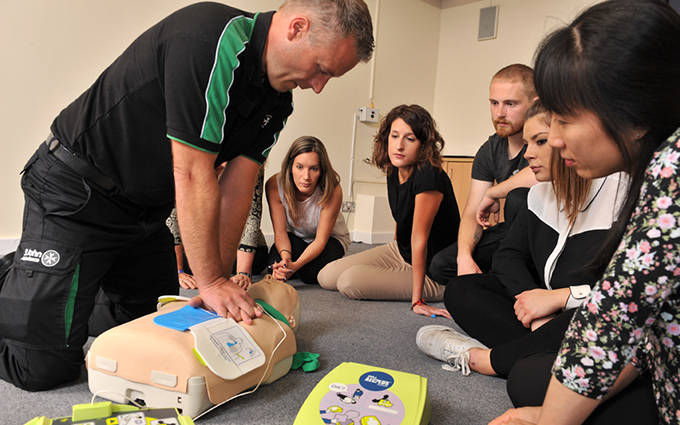Published: 6th November 2025.
Last updated: 6th November 2025.
Author: Cara Sherratt.
Contents

As British winter approaches, it's important to prepare for the challenges of colder weather. Winter presents its own set of unique accidents, emergencies and incidents that are worth preparing for. Although the seasonal changes present a lot of unknowns, harsher weather and more challenging conditions can provide an opportunity for unexpected emergencies. It is essential to ensure that your home, your vehicle and your place of work are prepared for any winter emergencies.
One way to do this is to ensure that you have a well-stocked winter car emergency kit, including in-date first aid supplies and other equipment that can be vital in an emergency. We’ve pulled together a list of essential first aid and emergency supplies that we recommend you kept in your vehicles throughout the winter.
Basic First Aid Kit Essentials
Your car first aid kit looks similar to your at-home first aid kit, specifically designed to be better suited to treat injuries on the go. These kits are useful in any season but can become crucial when help is delayed in winter weather.
- Dressings, Bandages, Plasters
Used to cover wounds, control bleeding, and protect injuries from infection. Plasters are small adhesive dressings used for minor cuts, while larger dressings and bandages are used for more serious wounds. - Cleaning Wipes and Hand Sanitisers
Antiseptic wipes are designed to clean wounds and disinfect the surrounding skin. They help reduce the risk of infection before applying dressings or plasters. Hand sanitisers provide an additional layer of protection from germs and infections by keeping hands clean. - Powder Free Gloves
A set of disposable gloves that protect both the first aider and the patient from cross-contamination. Powder-free options reduce the risk of allergic reactions and contamination of wounds. - Foil Blanket
Lightweight, reflective emergency foil blankets are used to retain body heat and reduce the risk of shock or hypothermia. - “Tuff-Kut” Scissors or Trauma Shears
Durable, blunt-ended scissors, Tuff-Kut scissors are designed to safely cut through clothing, bandages, jewellery or seatbelts without injuring the patient. - CPR Face Shield
Face shields and masks are barrier devices used to protect people when delivering rescue breaths during CPR. They help protect both the rescuer and the patient from potential cross-infection. Can be purchased individually, or as a keyring. - Up to date First Aid Information
Include up to date first aid guidelines and instructions as a manual or leaflet. Alternatively, you can sign up to the First Aid Fast app to access essential first aid information. Most importantly, ensure your first aid training is up to date by booking your annual refresher training or first aid at work requalification.
Whether you’d like to buy a complete vehicle first aid kit, a fully stocked first aid kit or individual items for your car emergency kit, browse the shop today to stock up on supplies, or replace outdated items.
Winter-Specific First Aid Items
Consider additional supplies during winter to store in your vehicle.
- Emergency Blankets – Lightweight blankets that help retain body heat and reduce the risk of hypothermia; especially useful in cold-weather emergencies.
- Hand and Foot Warmers - Small, heat-producing packs placed in gloves or boots to keep extremities warm.
- Thermal Socks and Gloves - Insulated clothing items that provide warmth to hands and feet, supporting circulation and preventing cold-related injuries like frostbite.
- Lip Balm and Skin Moisturizer - Protective balms and creams that prevent and soothe cracked, dry skin often caused by the cold, dry air, which can become painful or lead to infection.
Additional Layers of Clothing - Extra clothing or blankets offer vital insulation, helping maintain body temperature for those in shock or exposed to the cold during a first aid response.
Medications and Personal Needs
Other items you can keep close at hand include medicines or personal items that can assist in emergency situations that relate to yourself. If you have an underlying medical condition such as asthma or diabetes, it is not recommended to give medicines to others that they have not been prescribed. Keep your first aid training current to know which medications and situations first aiders are permitted to handle.
- Personal medication may include:
- Personal prescriptions or regular medicines
- Asthma inhalers
- Allergy medications or auto-injectors
- Pain relief such as paracetamol or ibuprofen
- Hay fever / antihistamine tablets
- Eye drops – to treat eyes if they have been irritated by wind or dry air
- Electrolyte tablets – electrolyte tablets or oral rehydration salts could be kept in case of dehydration
- Bottled Water – bottled water remains an essential thing to keep in your vehicle, for emergencies and for everyday use to avoid the effects of dehydration
- Emergency Snacks – in-date snacks can be a source of energy and prevent the effects of low blood sugar
- Battery Operated Torch – For emergencies or car issues that happen at night, a torch is useful and conserves phone battery power
- Warning Triangle – A must-have for emergency breakdowns. Warning triangles alert others to an incident warn other drivers of your roadside presence in advance.
- High Visibility Clothing – Anything from a simple high-vis jacket to reflective arm bands or other clothing that allows you to be seen during those long winter nights.
Pro Tips for Keeping Your Kit Effective
- Check it monthly during the winter to ensure it is proper stored and not impacted by extreme weather.
- Keep a record of expiry dates on supplies and replace any expired medications and single-use items as needed.
- Store your supplies in a sturdy, waterproof bag, first aid box or plastic container.
- Keep supplies easily accessible and not buried under luggage.
Preparing a winter-ready car first aid kit isn’t just about safety, it’s about peace of mind. Whether you're commuting to work, taking a weekend road trip, or just running errands, carry out the proper preparations that ensure you're ready for the unexpected.















